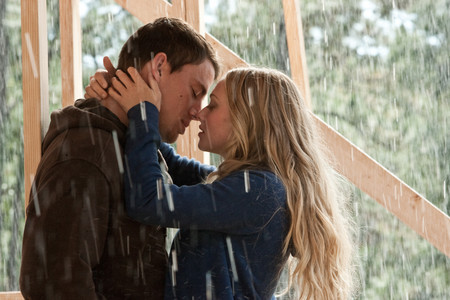‘Dear John’
A big ol' sloppy tub of mush.
That's "Dear John," the latest in a seemingly endless line of movies based on a seemingly endless line of Nicholas Sparks best-sellers.
Of course, it wouldn't be a Nicholas Sparks adaptation if it weren't a big tub of mush.
Besides, lots of people like the taste of mush -- especially Nicholas Sparks mush.
So please forgive me if you're a fan of this particular cinematic dish, but I just can't work up an appetite for yet another heaping helping of the same warmed-over sentiment.
From "The Notebook" to "Message in a Bottle," from "A Walk to Remember" to "Nights in Rodanthe," we've seen it before -- and better. (Although, in this context, "better" is a relative term.)
As usual in the Sparks-iverse, "Dear John" presents a heartfelt but rocky romance between two equally nice people who deserve every bit of happiness that eludes them -- mostly because they're too nice not to do the right thing, even if leads to heartbreak.
Also as usual, "Dear John" transports us to the picture-postcard realm of the Carolinas, where life moves at a stately, gracious pace -- thereby enabling our characters to stop and ponder the old-fashioned verities of life.
And we're definitely talking old-fashioned. After all, the story line hinges on the letters our two lovebirds send each other during an extended epistolary courtship. (Thomas Hardy and Gabriel Garcia Marquez wrote stories about this kind of thing, for crying out loud.)
It's spring break, 2001, and the beach near Charleston, S.C., is crowded with carefree young folks -- including our star-crossed couple.
He's solitary, strapping Army Ranger John Tyree (Channing Tatum), home on leave. She's college student Savannah Curtis (Amanda Seyfried of "Mamma Mia!"), who hails from a wealthy family but loves helping those less fortunate (which is practically everyone else), whether she's rebuilding hurricane-wracked homes or developing a bond with the autistic son of a neighbor ("E.T.'s" all-grown-up Henry Thomas).
Naturally, John and Savannah meet cute at the beach -- triggering jealousy in Savannah's I've-got-a-crush-on-you classmate (Scott Porter of "Friday Night Lights"). And, almost instantly, John and Savannah are inseparable -- which means Savannah spends a lot of time at John's house, where she wins over his obsessive, painfully withdrawn father (supporting all-star Richard Jenkins) as easily as she wins John's heart.
By the time John's ready to return to his Army unit, they're in love -- and he's determined to finish his tour of duty and come home to Savannah. (In Charleston.)
Before that happens, however, they vow to write to each other every day. But Sept. 11, 2001, changes everything -- and when duty calls, love can't possibly compete with war. Or can it?
Director Lasse Hallstrom ("The Cider House Rules," "Chocolat") and cinematographer Terry Stacey ("Adventureland," "American Splendor") create a languid, sun-dappled setting for the movie's multiple melodramas.
But screenwriter Jamie Linden ("We Are Marshall") skims the surface of every relationship, introducing and resolving conflicts in record time.
He also saddles the cast members with the kind of stilted dialogue that would sound lifeless -- even if it were being delivered by performers far livelier than "Dear John's" pretty, perfunctory lovers.
Seyfried's so utterly beatific (don't worry, she even gets to sing) that she turns Savannah into a plaster saint -- who never cracks, not even when life's slings and arrows target her. And Tatum (who also played a soldier in a much better movie about military-vs.-civilian conflicts, 2008's "Stop-Loss") spends most of the movie looking pained, without ever conveying the emotion behind the pain. (Except, perhaps, the pain of having to try and make this stuff convincing.)
Lucky for Jenkins (an Oscar nominee for his marvelously subtle performance in last year's "The Visitor"), and lucky for us, that his character has practically nothing to say. Jenkins can convey emotion without saying anything at all -- and proves it during one of "Dear John's" few genuinely moving scenes, when father and son share a quietly wrenching, totally wordless exchange.
Most of the time, however, "Dear John" prattles on and on and on -- without ever saying much of anything. Except exactly what you'd expect.
Contact movie critic Carol Cling at ccling@reviewjournal.com or 702-383-0272.
Review
"Dear John"
105 minutes
PG-13; sexual references, violence
Grade: C
at multiple locations
Deja View
Letters play a pivotal role in a wide variety of movies, from romantic comedies to war dramas. A few standouts:
"The Shop Around the Corner" (1940) -- Two feuding clerks (James Stewart, Margaret Sullavan) don't realize they're each other's anonymous pen pals in director Ernst Lubitsch's peerless romantic comedy, which inspired 1998's "You've Got Mail."
"A Letter to Three Wives" (1949) -- In director Joseph L. Mankiewicz's scintillating Oscar-winner, the title characters (Jeanne Crain, Linda Darnell, Ann Sothern) receive letters from the town flirt, who claims she's run off with one of their husbands (but doesn't say which one).
"84 Charing Cross Road" (1987) -- In this fact-based charmer, a 20-year correspondence leads to friendship for a feisty New Yorker (Anne Bancroft) and a British bookseller (Anthony Hopkins).
"Il Postino" (1994) -- An Italian letter carrier (Oscar nominee Massimo Troisi) learns to love poetry while delivering mail to exiled Chilean poet Pablo Neruda (Philippe Noiret).
"Letters From Iwo Jima" (2006) -- Director Clint Eastwood's haunting companion piece to "Flags of Our Fathers" explores the bloody World War II battle (and its aftermath) from the Japanese perspective.















